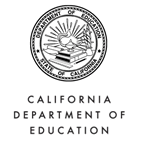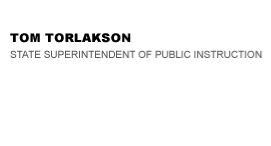Feb. 29, 2016 Every Student Succeeds Act Update


Official Letter
Official Letter
Dear County and District Superintendents and Charter School Administrators:
EVERY STUDENT SUCCEEDS ACT UPDATE
The purpose of this letter is to update you on the newly enacted Every Student Succeeds Act (ESSA) based on information we received from the U.S. Department of Education (ED) in letters dated January 28, 2016, February 2, 2016, and February 5, 2016. The ED has also begun a proposed rulemaking process to establish regulations for ESSA. As part of this process, the ED has developed Frequently Asked Questions for Transitioning to the Every Student Succeeds Act that is available on the ED Web site at http://www2.ed.gov/policy/elsec/leg/essa/faq/essa-faqs.pdf. We will continue to provide updates as information becomes available.
Title I Assessment
States and districts may be able to use current Federal formula grant funds, still in effect at least through the 2016–17 school year, under the ESSA, to:
- Conduct assessment audits to eliminate redundancy and ensure efficacy and quality of assessments;
- Facilitate professional development for educators to enhance the use of assessment results, including performance-based assessments, to improve instruction; and
- Increase transparency and timeliness of information for students and parents/guardians.
ESSA maintains the important statewide assessments every year from grades three through eight and once in high school, while balancing the need to provide students, parents, and teachers with information necessary to improve teaching and learning.
Title I Program Improvement
Although most of the new accountability provisions of the ESSA will not take effect until the 2017–18 school year, the guidance allows States the flexibility to not require local educational agencies (LEAs) to provide Supplemental Educational Services (SES), Public School Choice (Choice), and the related notice to parents for the 2016–17 school year. The California Department of Education (CDE) will be presenting a One-Year Transition Plan to identify possible alternatives for replacing the requirements of SES, Choice, and notification to parents for the 2016–17 school year. This plan will be presented at the State Board of Education (SBE) Meeting in May 2016. The plan will be posted no later than Friday, May 6, 2016.
LEAs and schools identified for Program Improvement (PI), corrective action, or restructuring in school year 2015–16 must continue to implement improvement activities in school year 2016–17, consistent with the Transition Plan or locally identified improvement activities.
Title I, Part C Migrant
Similar to other programs, the new allocation formula, definitions, and priority of services that include pre-Kindergarten and out-of-school youth will be in effect in school year 2017–18.
Title II Professional Development
The most recent letter from the ED states:
“In addition to the AMAOs mentioned above and the annual measurable objectives (AMOs) mentioned in my letter of December 18, 2015, there are additional provisions of the ESEA, as reauthorized by NCLB, along with their implementing regulations, that States are not required to implement in the 2016-2017 school year in order to facilitate an orderly transition to the ESSA. These provisions are as follows: section 1119, which requires all teachers of core academic subjects in the State to be “highly qualified”1,2; section 2141, which requires LEAs not making progress toward all teachers being “highly qualified” to create and implement an improvement plan and requires the State to provide technical assistance to such LEAs; and section 1117, which requires States to provide certain types of school supports and recognition.”
CDE staff are in the process of determining appropriate next steps for California’s transition to the new law in light of this new guidance. LEAs that were previously notified regarding placement in the Compliance Monitoring, Intervention, and Sanctions (CMIS) program for 2016–17 will soon receive additional information regarding participation in CMIS in a separate communication.
We appreciate your continued commitment to ensuring that all students have access to well-qualified educators and anticipate that we will have more information for LEAs regarding highly qualified teacher (HQT) requirements in the coming weeks.
Title III English Learners and Immigrant Students
There is no new information to report at this time.
Title IV 21st Century Schools
There is no new information to report at this time.
Local Control Funding Formula and Local Control and Accountability Plans
Following the March 2016 SBE meeting, CDE and SBE staff will provide detailed suggestions regarding proposed revisions to the Local Control and Accountability Plan (LCAP) and Annual Update template, for possible adoption by the State Board at its September 2016 meeting. Feedback from many stakeholders and various reports and research briefs have identified common themes around possible improvements to the current LCAP and Annual Update template. Given the timeline for the revision and adoption of the LCAP and Annual Update, stakeholders will have substantial opportunities to review draft components and prototypes of the revised LCAP template and to offer input and recommendations prior to the SBE’s adoption. The revisions to the LCAP template, in conjunction with the Local Control Funding Formula (LCFF) evaluation rubrics, will guide the approach to integrate the new federal accountability requirements through the ESSA State Plan and at the local level through the ESSA LEA Plan. The changes to the LCAP template are expected to become effective in the 2017–18 school year.
If you have any questions regarding this letter, please contact:
Title I Accountability: Jenny Singh, Administrator, Academic Accountability Unit, by phone at 916-319-0437 or by e-mail at jsingh@cde.ca.gov.
Title I Assessment: Jessica Barr, Administrator, Assessment Development and Administration Division, by phone at 916-319-0803 or by email at jbarr@cde.ca.gov.
Title I Program Improvement: Keith Coppage, Administrator, District Innovation and Improvement Office, by phone at 916-319-0599 or by e-mail at kcoppage@cde.ca.gov.
Title I, Part C Migrant:Celina Torres, Administrator, Migrant Education Office, by phone at 916-319-0230 or by e-mail at ctorres@cde.ca.gov.
Title II Professional Development: Carrie Roberts, Director, Professional Learning Support Division, by phone at 916-324-6599 or by e-mail at croberts@cde.ca.gov.
Title III English Learners and Immigrant Students: Elena Fajardo, Administrator, Language Policy and Leadership Office, by phone at 916-319-0247 or by e-mail at efajardo@cde.ca.gov.
Title III Accountability: Jonathan Isler, Administrator, Data Visualization Reporting Office, by phone at 916-319-0306 or by email at jisler@cde.ca.gov.
Title IV 21st Century Schools: John Hooper, Federal Policy Liaison, Government Affairs Division, by phone at 916-319-0650 or by e-mail at jhooper@cde.ca.gov.
Local Control and Accountability Plans: Jeff Breshears, Director, Local Agency Systems Support, by phone at 916-319-0303 or by e-mail at jbreshears@cde.ca.gov.
Sincerely,
/s/
Keric Ashley, Deputy Superintendent
District, School, and Innovation Branch
